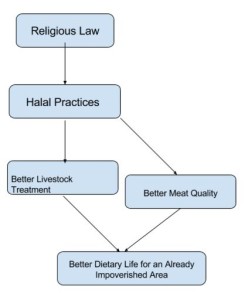Jordan’s population is over 95% Muslim., and if you lived or live in a Middle Eastern country, you know that finding pork in supermarkets is nearly impossible because it is against Islam to consume pork. This in a way can be considered a social norm; naturally, the christian demographic of the country, such as my mother, consume a lot less pork due to its rarity. For my 7 years of living in Jordan and the UAE, I can count the times I ate pork with my fingers on one hand since I was rarely exposed to it. My mother seemed to be okay with this, she said that asides from the occasional pork craving, the norm meant her eating less pork and residing to other meats such as chicken or lamb, which are considered to be healthier meats. In contrast, my roommates do most of the groceries and they love ham, sausage, and bacon, so by nature I’m bound to eat it a lot more when living with them, or living in the US in general since pork consumption can be considered a norm here.
When looking at Jordan’s entire dietary habits, I would say it’s tough to say that obesity rates are lower than the US’s because of the unavailability of pork since it’s a third world nation, and with poverty comes hunger and even famine. I do however, think that it is a contributor to the statistic as well as the vegetarian selection of food such as hummus, fava beans, and stuffed grape leaves. Another social norm relating to food is Halal preparation. Halal is a religious method of slaughter for meat that requires a sharp knife in order to kill the animal swiftly, the person slaughtering is also required to say a prayer before killing the animal. Halal practices in my opinion push for a sustainable food system, proving meat to come from a well treated, as well as pure since machines aren’t doing the killing. Since man does the slaughter, most butchers and meat companies don’t keep an excess of livestock and animals are generally treated better. In my opinion, Halal practices can be beneficial to a society, since the meat is shown have a much higher quality, even fast food meat like Burger King’s and McDonald’s is way better! (little pricier but totally worth it)


Hi, I was drawn to your post by your clever and punny title! I had no idea about any of the Halal practices and that is pretty cool to learn. Your culture and surroundings affects your food choices a lot more than my environment does. Your view point on this prompt is very unique considering a lot of the other students in our class have lived in America our whole lives. It is interesting to find out about Jordan and how obesity affects the social norms there differently than it does in America. Cool post! Here’s the link to mine http://geog030.dutton.psu.edu/2016/03/04/nicolina-dimascia-chicken-nuggets-are-my-life/
Good evening! My name is Michael Evangelista.
This is a fascinating look into a culture about which I know very little. The social and cultural norms are very different than the society in which I live.
The method of food preparation (killing) entirely different than that which is common in the United States. I have heard of Halal practices but you have provided additional insight into this area.
Yours is a very informative post. Thank you.
Here is a link to my post: http://sites.psu.edu/geog30/2016/03/04/geog-030-module-6-food-agriculture-mae26/
Hello!
My name is Dorish and I am a student at Penn State University Park studying aerospace engineering. I really enjoy the fact that you used a cultural norm as a social one too, because in America, I believe people enjoy bacon almost as much as they enjoy their favorite hobby. Pork is often viewed as a fatty food, and because it does not exist in places in the Middle East, can be a factor as to why the obesity rates there are much lower than they are here in America. The Halal practices do create a healthier society and I think its important to learn from other cultures and see how we can improve our own dietary lives in an area that may not even be impoverished but has very high obesity rates.
Great post, here is a link to my blog if you’d like to learn about factory farms!
http://geog030.dutton.psu.edu/2016/03/04/factory-farming/